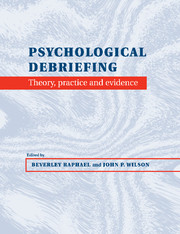Book contents
- Frontmatter
- Contents
- List of contributors
- Introduction and overview: Key issues in the conceptualization of debriefing
- Part I Key conceptual framework of debriefing
- Part II Debriefing: models, research and practice
- 5 Critical Incident Stress Management and Critical Incident Stress debriefings: evolutions, effects and outcomes
- 6 Debriefing with emergency services: Critical Incident Stress Management
- 7 Debriefing and body recovery: war grave soldiers
- 8 Debriefing and body recovery: police in a civilian disaster
- 9 Debriefing after massive road trauma: perceptions and outcomes
- 10 Debriefing and motor vehicle accidents: interventions and outcomes
- 11 Debriefing with service personnel in war and peace roles: experience and outcomes
- 12 Debriefing post disaster: follow-up after a major earthquake
- 13 Debriefing after disaster
- 14 Children and debriefing: theory, interventions and outcomes
- 15 Debriefing adolescents after critical life events
- Part III Adaptations of debriefing models
- Part IV Debriefing overview and future directions
- Conclusion: debriefing – science, belief and wisdom
- Index
6 - Debriefing with emergency services: Critical Incident Stress Management
from Part II - Debriefing: models, research and practice
Published online by Cambridge University Press: 06 January 2010
- Frontmatter
- Contents
- List of contributors
- Introduction and overview: Key issues in the conceptualization of debriefing
- Part I Key conceptual framework of debriefing
- Part II Debriefing: models, research and practice
- 5 Critical Incident Stress Management and Critical Incident Stress debriefings: evolutions, effects and outcomes
- 6 Debriefing with emergency services: Critical Incident Stress Management
- 7 Debriefing and body recovery: war grave soldiers
- 8 Debriefing and body recovery: police in a civilian disaster
- 9 Debriefing after massive road trauma: perceptions and outcomes
- 10 Debriefing and motor vehicle accidents: interventions and outcomes
- 11 Debriefing with service personnel in war and peace roles: experience and outcomes
- 12 Debriefing post disaster: follow-up after a major earthquake
- 13 Debriefing after disaster
- 14 Children and debriefing: theory, interventions and outcomes
- 15 Debriefing adolescents after critical life events
- Part III Adaptations of debriefing models
- Part IV Debriefing overview and future directions
- Conclusion: debriefing – science, belief and wisdom
- Index
Summary
EDITORIAL COMMENTS
This chapter presents a further view of the Mitchell's model of debriefing and Critical Incident Stress Management (CISM), setting it in a crisis intervention context. Robinson highlights the separation of this model from psychotherapy. She then goes on to differentiate it in professional and workplace terminology, as well as examining its historical context, current status and conceptual basis. The latter defines the social and health model in which it sits and its practical role in the emergency services. Here, its evolution is linked to changes in cultural attitudes towards the acceptance of the psychological trauma model, expansion of psychology and the development of the Mitchell model. She reviews evaluation studies in terms of acceptance of CISM in the emergency service workplace, the reported value of the service for recipients and empirical studies. The latter are reviewed with recognition of the methodological problems in those studies having negative, as well as those with positive, outcomes. The need for evolution of research design is emphasized in view of the complexity of trauma experience, response and other variables shaping outcomes. She also highlights her observation that many of the negative studies do notprovide definitions of the model of debriefing used, and target groups other than emergency workers. She emphasizes the need for the evidence base to be broadened and the essential need for systematic and convergent evaluation using a variety of appropriate methodologies to investigate specific research and evaluation questions.
Keywords
- Type
- Chapter
- Information
- Psychological DebriefingTheory, Practice and Evidence, pp. 91 - 107Publisher: Cambridge University PressPrint publication year: 2000
- 6
- Cited by

